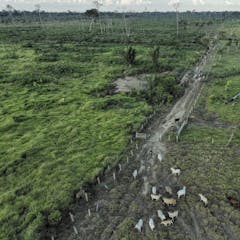
Articles on Genetics
Displaying 1 - 20 of 653 articles

Your sprinting skills have a lot to do with genetics, but your brain also plays a big role.

Our study turns a common way of thinking about depression on its head, which may influence how people are treated.

Children with childhood dementia progressively lose all previously acquired skills and abilities, such as talking, walking, learning, remembering and reasoning.

The genetic mutations responsible for the unusual physical features in animals can also cause great harm.

Functional precision medicine works to take the guesswork out of deciding which drug to try next for patients with cancers that don’t respond to standard treatments.

No treatments are currently available to cure Parkinson’s disease. Better understanding the genetic foundation of this condition can help researchers find ways to slow or halt its progression.

Calcite, the material making up fossilized eggshells, may preserve amino acids better than bone.

Vegetarian and low-carb diets aren’t ideal for our brains.

People should minimise contact with birds in areas affected by bird flu viruses, including farms and settings where live animals may be sold or slaughtered.

As New Zealand readies itself for AI-assisted medical treatment targeted to individuals, officials need to ensure the benefits outweigh the risks.

Research has revealed how British otters may have been able to recover from species loss in the 1950s with the help of otters from Asia.

Effective use of genomic identification could revolutionize the control of the illegal timber trade.

Canada needs additional regulation, developed through public consultations, stakeholder collaborations and community partnerships, to help regulate genetic testing and prevent genetic discrimination.

Green anacondas are the world’s heaviest snakes, and among the longest. it’s remarkable this hidden species has slipped under the radar until now.

Understanding how the ageing of sperm works in other animals is more important than ever as human male fertility is in decline.

Many people know someone with a genetic disease, but few understand how gene mutations work.

‘Jaws,’ published in 1974, terrified the public of sharks, but it also brought shark research into the scientific mainstream.

Improved understanding of the molecular mechanisms of addiction can change how researchers and clinicians approach treatments.

Genetic analysis reveals one of the teenagers probably had advanced gum disease.

Fruit bats can eat up to twice their body weight in fruit a day. But their genes and cells evolved to process all that sugar without any health consequences − a feat drug developers can learn from.





